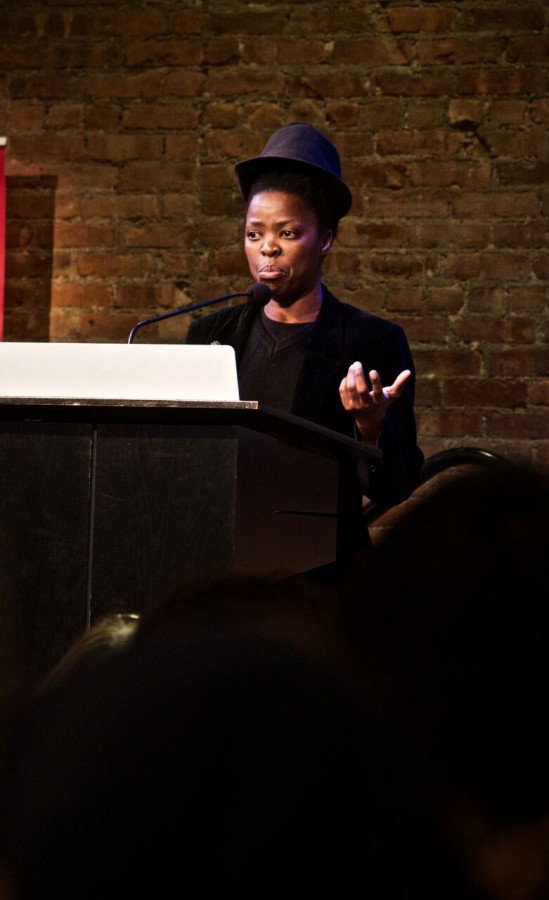Gallatin is the New Home For Zanele Muholi’s Expressive LGBTQI Photo Exhibit
Zanele Muholi’s quirky self-portraits and photographs of queer Africans reflect the struggles that people of African descent suffer.
February 22, 2016
Strikingly hyper-saturated black and white portraits have captured the attention of those passing by NYU’s Jerry H. Labowitz Theatre for the Performing Arts this week. The display is a gallery of works by renowned photographer and visual activist Zanele Muholi, who is revolutionizing the power of photography.
Muholi visited NYU Gallatin on Wednesday for a guest lecture regarding the story behind her work, as she shed light on the high number of hate crimes targeting black lesbian women in South Africa. An out lesbian herself, Muholi aims to give a voice to the LGBTQI community and spread a narrative that is pervasively silenced and neglected by institutions of power.
“I was thinking, we are not documented,” Muholi said. “We are not there. Nobody’s listening.”
This lack of recognition of both black lesbian women’s complex identities and of the ongoing struggles they face in South Africa compels Muholi to expose the truth. She references the growing count of brutal rapes and murders to which the South African government turns a blind eye. These statistics are more than just numbers to Muholi — they are the real stories of real people.
“We have a responsibility to document for our own communities. I’m writing these visual documents to make sure that we have visual history, for South Africa and beyond South African borders,” Muholi said. “Instead of being a visual artist, I am an activist, using visuals as a way to speak my own truth and the truths of those around me.”
Gallatin Senior Em Watson introduced Muholi to the stage, praising her portraits as an outlet of expression that underrepresented individuals can’t access conventionally.
“Her work represents the LGBTQI community in a way that is absent in mainstream media,” Watson said.
Zanele Muholi has only begun her plan to use photography as a force of representation. She hopes to pursue future projects that visually juxtapose the South African black struggle and the American black struggle. She referenced obscene police brutality in the U.S., citing the case of Sandra Bland specifically, and noted the obligation human rights activists have in recognizing each other’s struggles.
“I guess the commonality between us is when we think of Black Lives Matter,” Muholi said. “You have these racial attacks that are ongoing in this country and in South Africa.”
While many of Muholi’s projects capture LGBTQI members of her community, in her ongoing project “Somnyama Ngonyama,” she puts herself in front of the lens. Muholi said that she takes self-portraits because she doesn’t want to put the liability of shooting on anyone else. She views photography as a powerful force, comparing the act of capturing an image to the strike of a gun.
“Taking photos is like having a weapon in your hand,” she said.
“Somnyama Ngonyama” embodies Muholi’s work with self-expression, which she describes as her response to ignorant, hateful attitudes toward race and sexuality. The ongoing project will be complete once Muholi has 365 images of herself, and she vows to never use self-portraits once that is accomplished.
“I am shooting 365 portraits, then I will end. Because I just want to say to the racists that I’m actually black for 365 days of the year, same as the next black person,” she said. “This is our reality.”
A version of this article appeared in the Feb. 22 print edition. Email Jami Tanner at [email protected].












































































































































